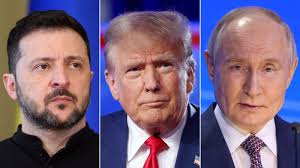The US is working towards an Easter ceasefire between Russia and Ukraine despite another night of intense drone strikes that have killed civilians in Kyiv.
The White House wants to secure a truce by Easter Sunday, which falls on April 20 in both the Western and Orthodox churches, officials told Bloomberg.
US officials will meet separately with Russian and Ukrainian representatives in Saudi Arabia this week for talks on a partial truce.
Ukrainian officials will meet US mediators on Monday in what is thought to be the first set of parallel negotiations since the early weeks of the war in 2022.
But the Kremlin on Sunday warned that progress on a deal would be unlikely as it was “only the beginning” of what were expected to be “difficult” negotiations.
The Saudi talks will discuss how to implement and monitor a 30-day truce on strikes against energy sites that was agreed upon by the Russian and Ukrainian presidents with Trump last week.
Dmitry Peskov, the spokesman for the Kremlin, said Moscow’s “main” focus would be on a possible resumption of a deal to ensure safe navigation for commercial vessels in the Black Sea.
Donald Trump pledged a quick resolution to the three-year-old war before he took office and last week said he expected to see a full ceasefire “pretty soon”.
He said at the weekend efforts to stop further escalation of the war were “somewhat under control”.
A further night of violence
But the president’s assurances were undermined on Saturday night after Moscow launched drone strikes killing civilians across Ukraine.
Seven people, including a five-year-old child, were killed and 10 others injured in Kyiv. In Donetsk, four people were killed, including three who died in a strike on the town of Dobropillya.
Zelensky urged allies to put fresh pressure on Russia to end the war.
“New decisions and new pressure on Moscow are needed to bring an end to these strikes and this war,” he said.
Ukraine’s air force said Russia had launched 147 drones across the country overnight, with attacks striking Kharkiv, Sumy, Chernihiv, Odesa and Donetsk regions, as well as the capital.
European diplomats warned that Putin appeared in no hurry to reach a deal or end his offensive, after he demanded aggressive concessions from Kyiv for any truce.
Kristine Berzina, a managing director at the German Marshall Fund in Washington, said: “I don’t see any reason to think that Russia is in a hurry to get to a ceasefire.
“If it seals the deal with the US, it’s going to be harder for Russia to maintain the relationships it has with China, with Iran and with North Korea and that’s not a step that Russia is going to take lightly.”
Grigory Karasin, leading the Russian negotiating team, said they would bring a “combative and constructive” approach.
He said: “We hope to achieve at least some progress.”
This weekend, Trump’s special envoy dismissed Sir Keir Starmer’s plan for an international force to support a ceasefire as “a posture and a pose”.
Steve Witkoff said the idea was based on a “simplistic” notion of the Prime Minister and other European leaders thinking “we have all got to be like Winston Churchill”.
While American officials may be aiming for Easter, they admit that timeline may slip given the large gaps between the two sides’ positions.
Keith Kellogg, Mr Trump’s special envoy to Ukraine, has described the Riyadh effort as “shuttle diplomacy” between hotel rooms.
Gitanas Nauseda, the Lithuanian president, said on Friday that Russia was “imitating negotiations, talking about a possible peace and possible ceasefire, but they are not even ready to keep the ceasefire as promised not to attack, not to strike critical infrastructure”.



